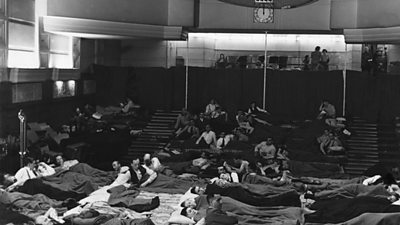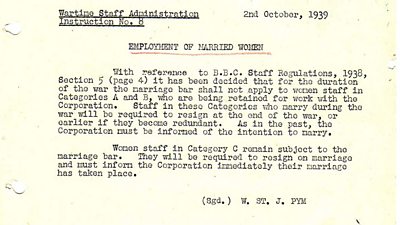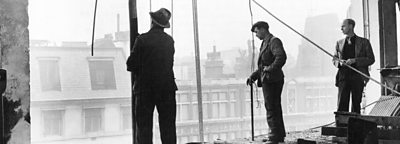The BBC is bombed
Hitler said that in war, words are actions. It is not surprising, then, that his bombers targeted Broadcasting House in London, or that the BBC had contingency plans for just such an event. These involved evacuating whole departments out of London. So Music went to Bedford, and Drama and Variety were based in Bristol until that city too came under fire, and Variety was transferred to Bangor in North Wales.
It all made programme making and scheduling more difficult, and was often unsettling for the individuals concerned. Variety staff in Bangor, for example, were made to feel unwelcome by the locals - possibly on account of their quirky personalities and dress sense.
In London the Criterion Theatre became the base for the BBC's Empire Entertainments Unit. Here the staff worked, ate and slept, sleeping in the dressing rooms and cloakrooms on makeshift beds, while broadcasts went out from the theatre stage. Similarly staff who remained at Broadcasting House often ate, slept and worked within the walls of the BBC. The Radio Theatre became a dormitory, in which a curtain separated the sleeping quarters of the men and women.

The London blitz started on 7 September 1940, and weeks later Broadcasting House took its first hit. A delayed action crashed through a window on the 7th floor, and came to rest two floors down in the music library.
Moments later, as firemen rushed to the scene, it exploded, killing seven people. Bruce Belfrage was reading the news at the time, and his microphone picked up the sound of the blast. But Belfrage, covered in dust and soot, read on regardless.
A month later, Adderley Park transmitter in Birmingham was destroyed, and staff in nearby a shelter were killed. Two weeks later a landmine exploded outside Broadcasting House, causing more damage. And on 10 May 1941, the worst night of the Blitz, bombs destroyed all the buildings on the eastern side of the Broadcasting House island site, killing a member of staff.
The Queens Hall, venue of the Proms, was hit and destroyed the same night, claiming further lives including one member of staff, while across London the BBC's Maida Vale studios took a direct hit.
Thorough preparations were made for Bristol to become the centre of operations if broadcasting from London became impossible. There were plans to build an emergency base in a disused railway tunnel. Areas of the tunnel would serve as dressing rooms, studios, control rooms, and a canteen, storing three months food supplies. The tunnel was declared structurally sound after being tested by the entire BBC symphony orchestra (100 instrumentalists) at full blast.
The employment of women
At the BBC and in many other organisations, attitudes in the workplace - for example, towards women - changed as a result of the war. By 1940 many women had taken over traditional male roles and many white collared occupations had abandoned the practice of asking women who got married to resign.

Married women at one BBC hostel even had a nursery where they could leave their children while working on their shift. Prejudices lingered, however. It would be a long time before women in the engineering department doing the same work as male engineers would be called engineers. In World War II they had to settle for the subordinate title of "operators".
